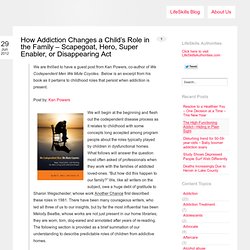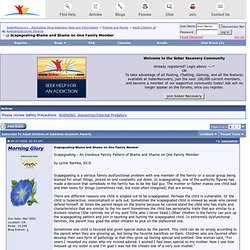

How Addiction Changes a Child’s Role in the Family – Scapegoat, Hero, Super Enabler, or Disappearing Act. We are thrilled to have a guest post from Ken Powers, co-author of We Codependent Men We Mute Coyotes.

Below is an excerpt from his book as it pertains to childhood roles that persist when addiction is present. Post by: Ken Powers We will begin at the beginning and flesh out the codependent disease process as it relates to childhood with some concepts long accepted among program people about the roles typically played by children in dysfunctional homes. What follows will answer the question most often asked of professionals when they work with the families of addicted loved-ones. “But how did this happen to our family?”
The Class/Family Clown draws attention away from the pain and dysfunction at home by entertaining others. “To diffuse the battles that often raged around us, or to divert our parents from their attacks on one another or other members of the family, some of us learned to entertain. The Super Enabler is the child often closest to the addict emotionally. Scapegoating: Blame & Shame on a Family Member. Scapegoating - An Insidious Family Pattern of Blame and Shame on One Family Member by Lynne Namka, Ed.D.

Scapegoating is a serious family dysfunctional problem with one member of the family or a social group being blamed for small things, picked on and constantly put down. In scapegoating, one of the authority figures has made a decision that somebody in the family has to be the bad guy. The mother or father makes one child bad and then looks for things (sometimes real, but most often imagined) that are wrong. There are different reasons one child is singled out to be scapegoated.
Sometimes one child is favored and given special status by the parent. All members of the family are affected. Often an insecure parent will be aggressive with one of the children to vent his own sense of frustration at not doing well in life. Bullying is always scapegoating. It seems as if we humans as a species seem to need someone to vent our anger on and make wrong. [FOUR] Roles In Dysfunctional Families.
By Robert Burney M.A.
![[FOUR] Roles In Dysfunctional Families](http://cdn.pearltrees.com/s/pic/th/dysfunctional-codependence-36934899)
"We have come to understand that both the passive and the aggressive behavioral defense systems are reactions to the same kinds of childhood trauma, to the same kinds of emotional wounds. The Family Systems Dynamics research shows that within the family system, children adopt certain roles according to their family dynamics. Some of these roles are more passive, some are more aggressive, because in the competition for attention and validation within a family system the children must adopt different types of behaviors in order to feel like an individual. " The emotional dynamics of dysfunctional families are basic - and like emotional dynamics for all human beings are pretty predictable. The outside details may look quite different due to a variety of factors, but the dynamics of the human emotional process are the same for all human beings everywhere. "Responsible Child" - "Family Hero" This is the child who is "9 going on 40. " "Acting out child" - "Scapegoat"
Roles In Dysfunctional Families.